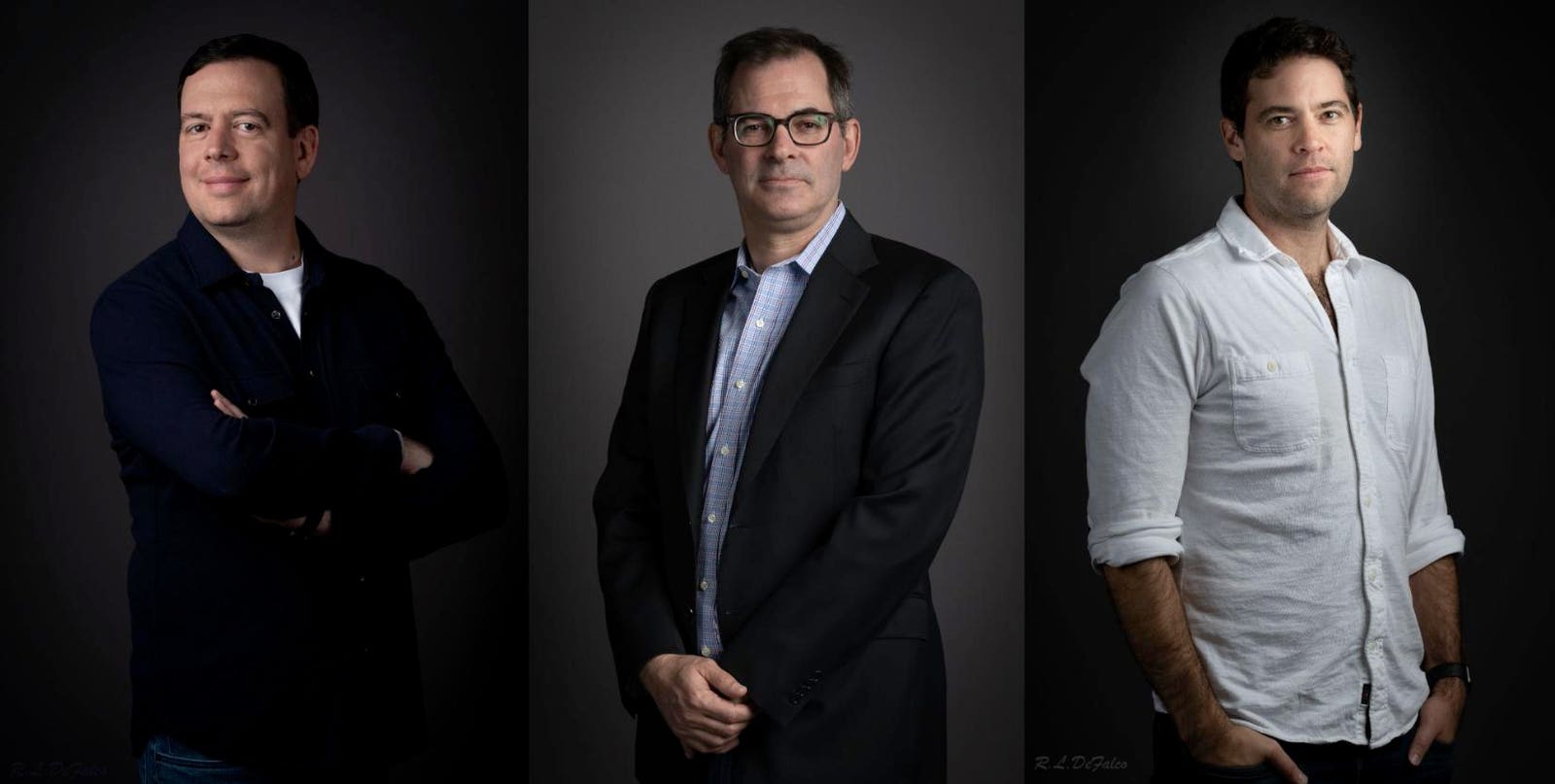CoreWeave cofounders Brian Venturo (chief strategy officer), Michael Intrator (CEO) and Brannin McBee (chief development officer), from left to right.
CoreWeave
CoreWeave made its public market debut on Friday with the first big IPO of 2025. The company, which rents cloud computing power to customers that need it for AI applications, exploded onto the scene over the last couple of years. On Friday, its stock closed around $40 per share, the same as its pricing, implying a valuation of $23 billion on a fully diluted basis (accounting for outstanding options and restricted stock).
“God, like, what a crazy thing to accomplish. I’ve been shoulder to shoulder with some of the most amazing people on the planet executing for the last seven years,” gushed cofounder and Chief Development Officer Brannin McBee in an interview with Forbes on Friday. “At the same time, it’s the quintessential ‘this is the beginning’ statement. … it’s just another day at CoreWeave.”
In one way it was: the cloud computing company, which initially aimed to raise between $2.3 billion and $2.7 billion ended up pricing its shares at $40, well below its target of $47 to $55. As such, the company raised less money ($1.5 billion) and at a lower valuation than they’d aimed for, per documents filed with the Securities and Exchange Commission. In fact its valuation of $23 billion is almost exactly what it was when it sold shares in a private transaction in October 2024, according to the company’s initial public offering prospectus filed in early March.
It was based on that information that Forbes declared the three founders and one board member all billionaires in early March. CEO Michael Intrator, Chief Strategy Officer Brian Venturo and McBee own 11%, 7% and 5% of CoreWeave’s shares, respectively, while board member Jack Cogen owns 4%. After factoring in the stock they sold while CoreWeave was still a private company, Forbes estimates that Intrator is now worth $2.7 billion, Venturo is worth $1.7 billion, McBee is worth $1.3 billion, and Cogen is worth $1 billion; those net worths are actually down more than 10% apiece than when we first estimated their fortunes, due to the lower pricing. A spokesperson for CoreWeave did not respond to a request for comment on the cofounders’ net worths.
“I think we raised exactly what we needed for the business,” McBee says. “Pricing discovery is hard. Pricing discovery is harder in market volatility. But what you’re looking at today is a business with immense value and immense investor interest.”
CoreWeave is in many ways a poster child of the exponentially growing appetite for computing power for the AI boom. In 2017, the then-commodity traders Intrator, Venturo and McBee started Atlantic Crypto, using Nvidia chips they’d stockpiled to mine cryptocurrency. Two years later, they renamed it CoreWeave and shifted the business model to building data centers and selling computing power to companies that didn’t have enough of their own GPU servers–storage systems comprised of electronic circuits called graphics processing units. After OpenAI released ChatGPT in 2022 and unleashed something of an AI firestorm, CoreWeave’s customers were, increasingly, AI companies. Now, according to the company’s new filing, CoreWeave’s biggest customers are Microsoft, IBM, Meta, NVIDIA and billion-dollar AI labs Cohere and Mistral.
Still, investors expressed concerns about CoreWeave’s dependence on these large customers (with $10-billion-plus, multi-year deals with OpenAI and Microsoft; the latter generated more than 60% of CoreWeave’s 2024 revenue), heavy net losses ($860 million on $1.92 billion in revenue in 2024) and debt-reliant financing. The OpenAI deal, a $12 billion contract announced on March 10, complements OpenAI’s “commercial deals with Microsoft and Oracle, and our joint venture with Softbank on Stargate,” CEO Sam Altman wrote in a press release—referring to a $500 billion partnership aiming to secure American AI supremacy.
McBee isn’t worried. “It’s a bit of a self-reinforcing mechanism,” he says. “If we’re helping the biggest companies grow, they’re just going to get bigger.” Between glances out the window, he adds that CoreWeave plans to target slightly smaller customers to diversify their customer base. On CoreWeave’s path to profitability, McBee is confident that the company’s contracts will pay off infrastructure costs in less than three years.
Also up in the air, of course, is whether demand will continue to grow. It’s expensive to build data centers, and CoreWeave has 32 of them running more than 250,000 GPUs as of the end of 2024—and plans to continue expanding long-term. CoreWeave is certainly betting that it will. In late 2024, for example, CoreWeave signed a 15-year, $4.5 billion agreement with crypto company Galaxy to lease their data center in west Texas.
Regardless of where CoreWeave’s share price ends up, the cofounders have nothing to worry about—financially speaking. They have cashed out more than the typical pre-IPO founder does: the three cofounders and Cogen each sold more than $150 million of CoreWeave’s shares (before taxes) as part of private market sales in 2023 and 2024.
McBee says the cofounders intend to stay at CoreWeave for the foreseeable future. “We are the long-term management team,” he says. “We have so much to build.”

